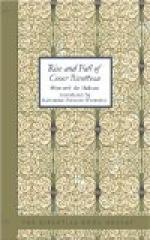Feeble existences, like that of Birotteau, live sunk in sorrows, instead of transmuting them into doctrines of experience: they let them saturate their being, and are worn-out, finally, by falling more and more under the weight of past misfortunes.
When the two couples reached the path which leads to the woods of Aulnay, placed like a crown upon the prettiest hillside in the neighborhood of Paris, and from which the Vallee-aux-Loups is seen in all its coquetry, the beauty of the day, the charm of the landscape, the first spring verdure, the delicious memory of the happiest day of all his youth, loosened the tight chords in Cesar’s soul; he pressed the arm of his wife against his beating heart; his eye was no longer glassy, for the light of pleasure once more brightened in it.
“At last,” said Constance to her husband, “I see you again, my poor Cesar. I think we have all behaved well enough to allow ourselves a little pleasure now and then.”
“Ought I?” said the poor man. “Ah! Constance, thy affection is all that remains to me. Yes, I have lost even my old self-confidence; I have no strength left; my only desire is that I may live to die discharged of debt on earth. Thou, dear wife, thou who art my wisdom and my prudence, thou whose eyes saw clear, thou who art irreproachable, thou canst have pleasure. I alone—of us three—am guilty. Eighteen months ago, in the midst of that fatal ball, I saw my Constance, the only woman I have ever loved, more beautiful than the young girl I followed along this path twenty years ago—like our children yonder! In eighteen months I have blasted that beauty,—my pride, my legitimate and sanctioned pride. I love thee better since I know thee well. Oh, dear!” he said, giving to the word a tone which reached to the inmost heart of his wife, “I would rather have thee scold me, than see thee so tender to my pain.”
“I did not think,” she said, “that after twenty years of married life the love of a wife for her husband could deepen.”
These words drove from Cesar’s mind, for one brief moment, all his sorrows; his heart was so true that they were to him a fortune. He walked forward almost joyously to their tree, which by chance had not been felled. Husband and wife sat down beneath it, watching Anselme and Cesarine, who were sauntering across the grassy slope without perceiving them, thinking probably that they were still following.
“Mademoiselle,” Anselme was saying, “do not think me so base and grasping as to profit by your father’s share which I have acquired in the Cephalic Oil. I am keeping his share for him; I nurse it with careful love. I invest the profits; if there is any loss I put it to my own account. We can only belong to one another on the day when your father is restored to his position, free of debt. I work for that day with all the strength that love has given me.”
“Will it come soon?” she said.




